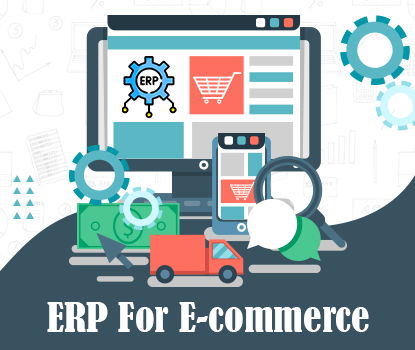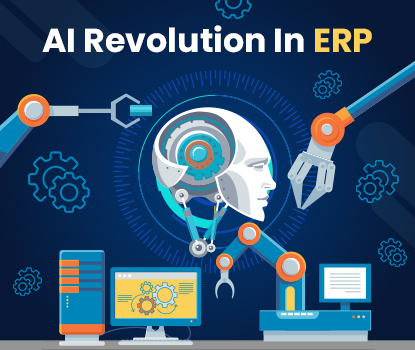Are you ready to unlock the full potential of your e-commerce business? Have you ever wondered what sets apart highly successful online retailers from the rest of the pack? In a digital marketplace where customer experiences and sales performance are paramount, the role of technology is more critical than ever. This leads us to a fundamental question: How can e-commerce businesses optimize customer experiences and boost sales in an increasingly competitive landscape?
In the world of e-commerce, where every click counts and user satisfaction is a top priority, leveraging the right tools and strategies is essential. Learn how ERP for eCommerce can be the game-changer you need to enhance your e-commerce operations.
Let's dive into this dynamic realm ERP for e-commerce, where every interaction counts, and unveil how ERP can empower your business to deliver exceptional customer experiences and achieve remarkable sales growth. It's your opportunity to stay ahead in the fast-paced world of online retail.
What is The Role of ERP in eCommerce?
Enterprise Resource Planning (ERP) plays a crucial role in the world of e-commerce, offering a multitude of benefits to businesses. Let's take a closer look at this role with some relevant statistics:
-
Efficient Inventory Management
Inventory management is a cornerstone of e-commerce success. An ERP system helps e-commerce businesses maintain accurate stock levels, reducing overstock and understock situations. According to Statista, 34% of e-commerce companies cited inventory management as the most essential function of ERP systems.
-
Order Processing and Fulfillment
ERP systems streamline order processing and fulfillment, ensuring that orders are processed promptly and accurately. In a study by Acumatica, 60% of companies said that improving order processing is one of their top ERP-related goals.
-
Data Centralization
ERP systems centralize e-commerce data, creating a single source of truth for the organization. This enhances decision-making by ensuring that everyone has access to accurate and up-to-date information. As per Aberdeen Group, 47% of companies reported data integration and visibility as a significant benefit of ERP systems.
-
Improved Customer Service
Exceptional customer service is a hallmark of successful e-commerce. ERP systems provide access to comprehensive customer data, enabling personalized interactions and efficient issue resolution. Gartner predicts that 89% of companies will compete primarily on customer experience.
-
Multi-Channel Sales
E-commerce businesses often operate on multiple sales channels, including websites, marketplaces, and social media. An ERP system can manage these various channels, offering a unified view of sales and inventory. According to eMarketer, 65% of e-commerce sales worldwide are expected to come from mobile devices by 2021.
-
Scalability
As e-commerce businesses grow, their ERP systems can often scale to accommodate increased data and user requirements. This scalability allows organizations to adapt to changing business needs. According to Grand View Research, the global e-commerce market size is expected to reach $24.3 trillion by 2025.
-
Real-Time Insights
ERP for eCommerce provide real-time insights into various aspects of business, from inventory levels to financial performance. This increased visibility empowers management to make informed decisions. In a survey by Vanson Bourne, 85% of executives said that access to real-time data is vital for their business.
-
Security and Compliance
E-commerce businesses handle sensitive customer data and must comply with data protection regulations. ERP systems help ensure compliance and strengthen security measures. G2 Crowd reports that 52% of ERP users state that the security of their data has improved since implementing ERP.
-
Cost Efficiency
While implementing an ERP system can be a significant upfront investment, it often leads to cost savings in the long run. Efficiency improvements, reduced manual labor, and better inventory management can contribute to lower operational costs. According to The State of E-Commerce, cost management is a priority for 43% of e-commerce businesses.
-
Competitive Advantage
E-commerce is highly competitive, and businesses that leverage ERP systems effectively often gain a competitive advantage. This advantage allows them to respond quickly to market changes, meet customer demands, and innovate more efficiently. As per BigCommerce, the average cart abandonment rate in e-commerce is 69.57%, highlighting the importance of a seamless shopping experience.
How ERP Software Case Improve Sales?
Enterprise Resource Planning (ERP) software can significantly improve sales for businesses. Let's explore how ERP systems contribute to increased sales, supported by relevant statistics:
-
Enhanced Data Analysis
ERP systems provide real-time insights into sales data, customer behavior, and market trends. These insights empower businesses to make data-driven decisions and optimize sales strategies. According to Aberdeen Group, businesses with an ERP system achieve a 19% increase in customer retention rates.
-
Efficient Lead Management
ERP for eCommerce helps businesses manage leads more effectively. It centralizes lead data, tracks lead interactions, and automates lead nurturing processes. A study by Salesforce found that businesses using CRM software, often integrated with ERP, can increase their sales by 29%.
-
Streamlined Sales Processes
ERP systems streamline sales processes, from order processing to inventory management. This efficiency ensures that sales orders are fulfilled promptly and accurately, leading to improved customer satisfaction. A survey by Acumatica revealed that 60% of companies aim to enhance order processing through their ERP system.
-
Personalized Customer Interactions
ERP systems centralize customer data, enabling personalized interactions. This personalization enhances customer experiences and fosters brand loyalty. According to Segment, 71% of consumers feel frustrated when their shopping experience is impersonal.
-
Inventory Management
Proper inventory management is crucial for e-commerce sales. ERP systems help businesses optimize their inventory levels, reduce carrying costs, and prevent stockouts, ensuring that products are available when customers want to buy. The State of E-Commerce reports that 35% of consumers will abandon their carts due to out-of-stock items.
-
Multi-Channel Sales
ERP systems facilitate multi-channel sales, allowing businesses to sell their products across various platforms, including websites, marketplaces, and social media. This broadens the customer reach and potential for increased sales. According to Shopify, e-commerce sales from social media platforms grew by 76% in 2020.
-
Sales Forecasting
ERP software, often integrated with AI and data analytics, can predict sales trends and customer demand. This forecasting enables businesses to stock the right products and launch marketing campaigns at the optimal time. Gartner predicts that by 2025, 50% of large enterprises will have successfully personalized their ERP experiences.
-
Streamlined Pricing Strategies
ERP systems support dynamic pricing strategies. Businesses can adjust prices based on market conditions, demand, and competitor pricing, maximizing revenue. According to McKinsey, dynamic pricing can increase profits by 2-5%.
-
Improved Customer Service
Efficient order processing and access to customer data within ERP systems lead to better customer service. Satisfied customers are more likely to make repeat purchases and refer friends and family. A study by Zendesk found that 74% of consumers are likely to make another purchase if their issue is resolved quickly.
-
Cost Savings
ERP software can lead to cost savings, which can be redirected into sales and marketing efforts. Efficiency improvements, reduced manual labor, and better inventory management contribute to lower operational costs. A report by Capgemini states that AI can lead to cost reductions of up to 15% in business processes.
Conclusion
In the fast-paced world of e-commerce, where customer experiences and sales performance are the cornerstones of success, businesses must leverage the right tools and strategies to stay ahead. It's no longer a question of whether technology should play a role; it's a matter of how effectively you can embrace the tools that make a difference.
In this digital landscape, ERP for eCommerce has emerged as a game-changer, offering e-commerce businesses a myriad of advantages. From streamlining inventory management to optimizing sales processes and providing real-time insights, ERP can empower your business to deliver exceptional customer experiences and achieve remarkable sales growth.
As the e-commerce market continues to expand and competition intensifies, it's crucial to stay ahead of the curve. By integrating ERP for eCommerce into your operations, you're not only keeping pace with the evolving demands of online retail but also positioning your business for success in an increasingly competitive and customer-centric environment.
Your e-commerce journey to enhanced customer experiences and increased sales starts here. It's time to unlock the full potential of your online retail business with the transformative power of ERP for eCommerce.




